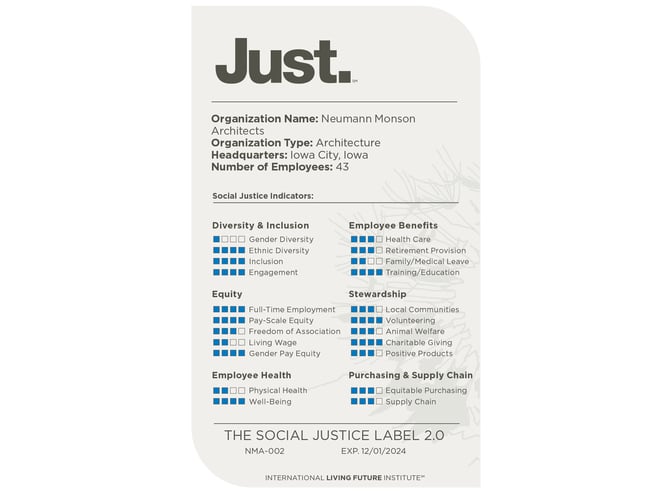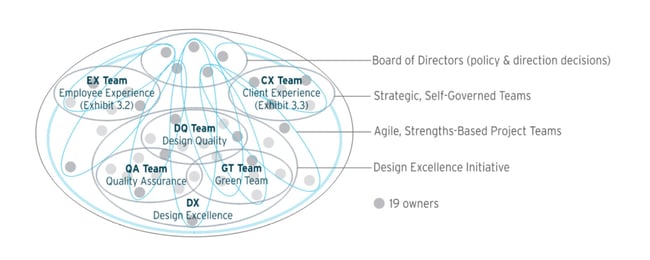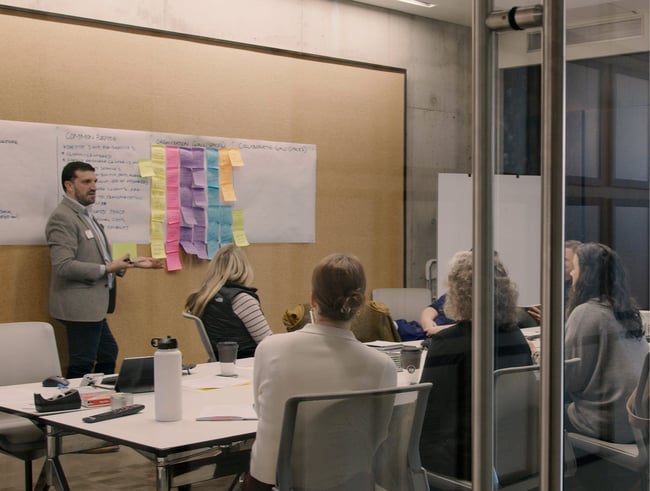Just Label 2022: Updates and Improvements

Created by the International Living Future Institute (ILFI), Just is a “nutrition label” that measures an organization’s commitment to equity and social justice. It is a voluntary program that allows organizations to assess their operations and disclose how they treat their employees and where they make financial and community investments.
We completed our first Just Label in 2020 and applied for renewal in 2022. Initially, pursuing a Just Label was one way to respond to the social unrest of 2020. Our goal was to examine our practices through a fresh perspective, make changes, and “be the change” we wanted to see in the world.
Over the last two years, we’ve made improvements in several categories, including:
- Freedom of Association
- Employee Health
- Well-Being
- Local Communities
- Animal Welfare
- Charitable Giving
- Equitable Purchasing
This article will discuss the policies and practices that have helped improve our score and our opportunities for growth.

Just Label 2022
Improvements to our Just Label
Freedom of Association: Level Two to Level Three
The Freedom of Association metric assesses an organization’s support of employee self-organization.
At Neumann Monson, we work to decentralize decision-making with organically formed, staff-led teams overseeing our strategic priorities. Employees can join a team of their choosing, regardless of experience level.
Over the last year, we have broadened our ownership to include 19 of our 43 employees and have developed a succession plan that looks 40 years into the future. Invitations to become owners and advance to the next ownership tier are based on a vote from the shareholders, further decentralizing decision-making.
This change—along with our support of professional trade organizations—has helped improve our commitment to self-organization.

Strategic teams at Neumann Monson
Employee Health: Level One to Level Two
The Employee Health metric assesses an organization’s support of their employees’ physical health.
After receiving our first Just Label, we completed a CDC health assessment and are following the CDC’s Workplace Health Model—an effort spearheaded by our Employee Experience team. The Health Model is comprised of four steps:
- Assessment
- Planning
- Implementation
- Evaluation
We have completed the first two steps and are now working to implement the benefits and practices outlined in the Health Model. By our next renewal, we hope to meeting Level 3 as we work through the implementation phase.
Well-Being: Level Three to Level Four
The Well-Being metric focuses on an organization’s commitment to providing a healthy work environment. Organizations should seek to reduce work-related stress by creating a nourishing and energizing culture.
Recently, we have implemented a written policy about well-being that includes flexible working options to promote a work/life balance. Repeated Employee Experience recognitions—including Zweig’s “Best Places to Work” award—provide third-party proof of our commitment to employee satisfaction.
Local Communities: Level Two to Level Three
This metric assesses organizations’ relationships with the communities they serve and where they operate. It pushes organizations and their employees to actively promote local health and vibrancy.
We have long partnered with area non-profits like Shelter House, Metro High STEAM Academy, and Goodwill of the Heartland. To further our commitment, we have become more intentional with getting community input on our projects.
Whether public or private, we work to engage the community through activities like:
- Listening sessions
- Needs assessments
- Planning workshops
- Web-based surveys
- Public forums
Our recent experience with the Living Building Challenge (LBC)—including the Stanley Center for Peace and Security and our Iowa City studio redesign—has increased our interaction with local historians, ecologists, and artists. We are also bringing outside expertise into our weekly ideation sessions to enhance our understanding of the community and align our work with public priorities.

Community visioning workshops
Animal Welfare: Level Two to Level Three
The Animal Welfare metric pushes organizations to develop policies, programs, and practices that support humane and compassionate animal treatment.
We have a written policy that states our commitment to not be involved with the production, promotion, or sale of goods and services that are antithetical to animal well-being.
We are working to expand our commitment by promoting dietary options that do not rely on the exploitation of animals. At catered events and external functions, at least half of all food options are plant-based.
Equitable Purchasing: Level Two to Level Three
The Equitable Purchasing metric calls on organizations to procure products and services that have a positive impact on people and the environment.
After 2020, we became more diligent with vetting services and began prioritizing locally-owned and certified minority-owned businesses. Over 30% of our purchased products and services came from locally-owned businesses, and minority-owned businesses accounted for 6% of our purchases.
We also seek partnerships with other organizations that have completed a Just Label, spreading the impact of the initiative. In the future, we plan to be even more intentional with our purchases and further improve in this category.
Opportunities for Growth
While we’ve seen improvements over the last two years, there are plenty of opportunities for growth.
Improving diversity and inclusion is one of our priorities. Historically, the architectural profession has seen gender and ethnic disparities—with women accounting for 36% of the profession and members of racially or ethnically diverse demographic groups making up 31% at the national level.
Our 2020 Just Label pushed us to be more intentional with hiring and recruitment. Since 2020, 64% of our new hires have been female and 43% identify as ethnically diverse.
Although we have increased the diversity of our staff, we will need to make further progress to improve our Just Label score. Organizations can achieve a Level 2 score for Gender Diversity if women constitute 25% of the senior leadership team.
Currently, women constitute 16.5% of our Principals and Associate Principals. Diversity should be present at all levels of an organization—and we hope to make this possible through inclusive hiring practices, mentorship, and defined career paths through ownership and succession planning.
Enhancing our Mission through the Just Label
The Just Label is an opportunity for self-reflection. It has helped us notice our blind spots and assess aspects of our operations that may have gone unnoticed.
Completing our first Just Label in 2020 helped us identify areas of improvement, and we are happy to see measurable progress. But the work is not complete, and we are working to make improvements in several categories, especially Gender Diversity and Physical Health.
The Just Program pushes organizations toward a more sustainable and equitable future by asking them to consider how they treat their employees and where they make financial investments. We encourage any organization—including our clients and partners—to complete a Just Label and get a deeper understanding of their social impact.
Learn more about the Just Label by visiting the ILFI’s website.